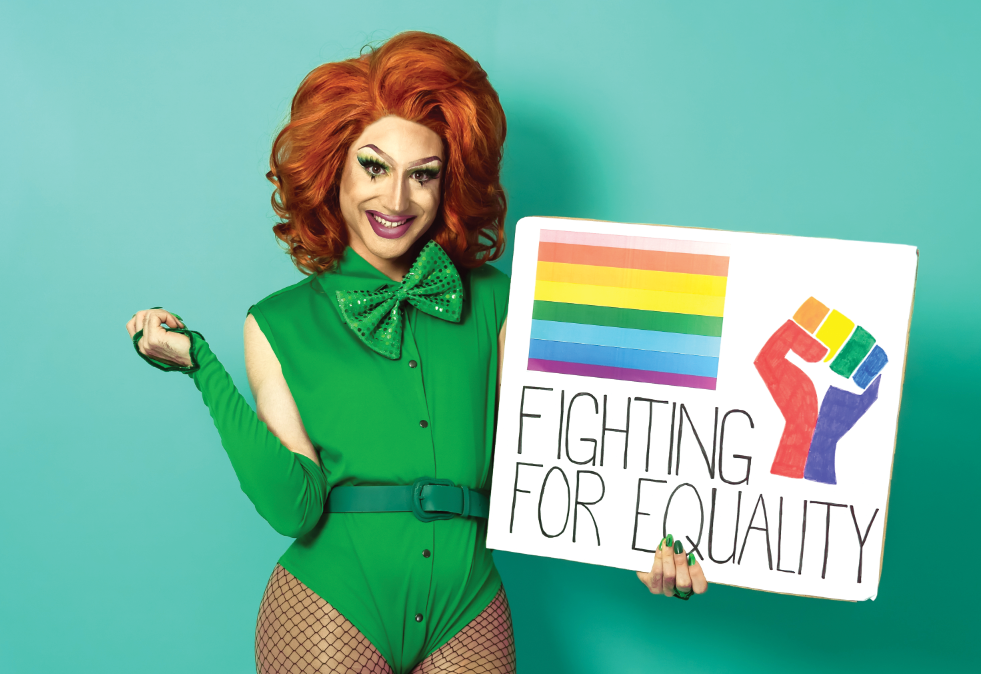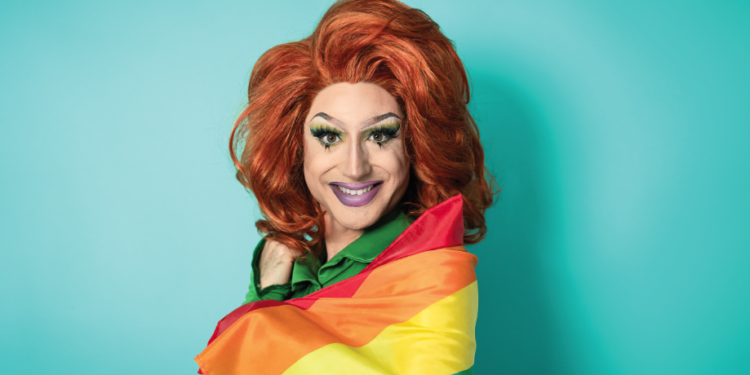“Out of the bars and into the streets,” Coco Peru recounted chanting at young bargoers when conversations first began circulating around the topic of “gay marriage,” the legendary drag queen shared on Delta Works’ hit podcast, Very Delta.
Peru compared the long-hard campaigns for marriage equality to our contemporary fights to protect trans and gender non-conforming youth and adults and in some places even drag. The release of the April 3 episode coincides with a temporary victory for opponents of Tennessee’s so-called “Drag ban.”
Early March, Tennessee passed a statute which makes it “an offense for a person to perform adult cabaret entertainment,” either “on public property” or “in a location where the adult cabaret entertainment could be viewed by a person who is not an adult.” The “drag ban” is much more than that, though and are purposefully vague.
Peru’s words echoed a growing sentiment that has identified this political juncture, where over 400 anti-trans bills have been introduced across the country, according to the American Civil Liberties Union, as this generation’s galvanizing moment, akin to time periods such as the AIDS epidemic, the passage and then repeal of Don’t Ask, Don’t Tell, and state and federal victories for same-sex partnership recognition.
Tennessee’s new law broadly defines “adult cabaret entertainment” to include “topless dancers, go-go dancers, exotic dancers, strippers, male or female impersonators.” Punishment includes a class A misdemeanor for first offenses and a class E felony for repeat offenses.
The law also states that it preempts ordinances or licenses that were lawfully adopted or issued prior and prohibits local municipalities from adopting ordinances contrary to this new state law.
The day before the bill was to go into effect, Federal Judge Thomas Parker issued a temporary restraining order against enforcement, but only for 14 days. Judge Parker, a Trump Administration appointee, cited the likelihood that the law would be found unconstitutional in using the TRO.
The organization which sought the protective order is Friends of George’s, a Memphis-based LGBTQ theatre company non-profit that produces “drag-centric performances, comedy sketches, and plays,” including one set for April 14.
They argued that the Tennessee statute was a content-based restriction on speech and should be struck as unconstitutional because it was also vague and overly broad.
Legal Challenge: Standing
Similar to Florida’s defense to legal challenges of their “Don’t Say Gay” bill, Tennessee attempted to argue that the complaining party lacked standing, the ability to participate in a case. Standing is found by demonstrating a sufficient connection to and harm from the challenged law.
In arguing against the injunction, defendants also argued that the plaintiffs had now shown that either the governor nor the attorney general “had taken or might take any enforcement action against” them.
However, Judge Parker recognized that the law, as written, was too vague to provide proper notice of what conduct was restricted. The Judge even stated the bill would require those in Tennessee to “eat the proverbial mushroom to find out whether it is poisonous.”
Judge Parker noted that the non-profit had a “reasonable fear of prosecution for conducting shows similar to those it has performed in the past.” Judge Parker recognized the immediate need for relief because the theatre company was selling tickets to a show while trying to figure out if it should “add previously unnecessary age restriction, cancel the show, or risk criminal prosecution or investigation.”
The issues of causation and redressability were “closer” questions because the statute did not task either the governor or attorney general with enforcement. However, Judge Parker weighted more heavily “the risk of chilling speech because of the Statute’s vagueness” over “the enforcement mechanism’s ambiguity,” quoting a Supreme Court case’s logic: “We would not uphold an unconstitutional statute merely because the Government promised to use it responsibly” (United States v. Stevens).
Weighing in favor of the non-profit was the fact that the statute had not gone into effect and granting the TRO would preserve the status quo.

Legal Challenge: First Amendment
The First Amendment generally prevents states from limiting speech and expressive conduct based on the ideas expressed. In analyzing first amendment issues, the court will look to see if the regulation is content based, either facially or even if neutral will consider legislative history. Additionally, the court must determine if the law is too vague to give proper warning of what conduct is regulated or if it is so overly broad that it regulates more conduct than is necessary.
Content-based restrictions are reviewed under the highest level of review, called strict scrutiny. Under this analysis, the law will only be upheld if it is justified by a compelling government interest and is narrowly tailored to serve that specific interest.
In concluding that the Tennessee statute is likely a content-based restriction, Judge Parker likened the case to the R.A.V. v. City of St. Paul (1992). There, a teenager was charged under a bias-motivated crime municipal ordinance which made illegal the burning of crosses or Nazi swastikas or use of other communication to “arouses anger, alarm or resentment in others on the basis of race, color, creed, religion or gender.”
The teenager erected and burned a makeshift cross in front of an African American family’s home. The Supreme Court unanimously struck down the ordinance as an unlawful content-based restriction noting, “Let there be no mistake about our belief that burning a cross in someone’s front yard is reprehensible. But St. Paul has sufficient means at its disposal to prevent such behavior without adding the First Amendment to the fire.”
The legislative history was pretty clear: The statute’s sponsor, Tennessee State Representative Chris Todd, filed a lawsuit asking a state court to declare a drag show a public nuisance. The show was part of the festivities planned for Jackson Pride’s third annual Pride in October 2022. The public backlash from the suit resulted in the event being moved from a public park to an indoor facility.
Judge Parker highlighted Defendants’ lack of a clear answer to the Statute’s purpose considering current state obscenity laws that covered most if not all the same conduct. Concerns for self-censorship and selective enforcement were also mentioned in the order.
In all, Tennessee’s drag ban may be on hold for now, but we must wait and see what will next because the TRO is only in place for 14 days.
In the meantime, we must all remember that while this fight was in Tennessee, it impacts all of us because we are a community connected by the trauma of needing to find ourselves before we can find each other.
Those most vulnerable are our youth, especially our trans and gender non-conforming youth. They face higher rates of homelessness, substance abuse, and suicide attempts. These disparities are often due to discrimination, lack of access to healthcare, and societal stigma. Tennessee’s efforts to add more coals to the fire through criminalization only adds to the societal stigma and discrimination. They know that.
In the face of all this, we must stand up, fight back, and remember that drag and drag queens have always been political. Coco Peru said it in her interview, “change doesn’t happen.” We must go out and make it happen.









